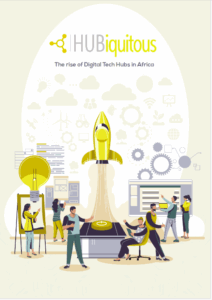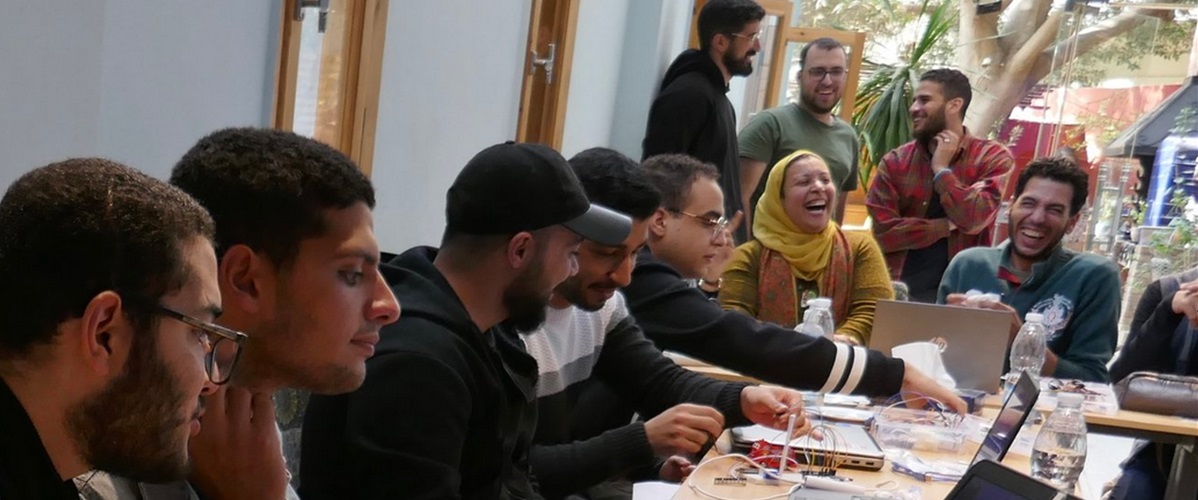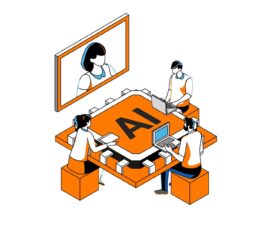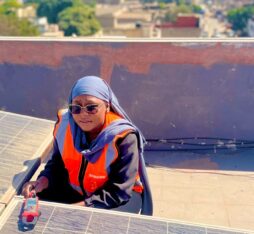Introduction
We are currently experiencing the fourth industrial revolution, with digital innovations playing a central role in influencing all aspects of our daily lives (Schwab, 2016)[1]. European countries, along with other developed nations, are rapidly accelerating their digital transformation by actively engaging all key stakeholders in the innovation ecosystem (OECD, 2020)[2]. The result is mass adoption of emerging technologies such as the IoT (Internet of Things), AI (Artificial Intelligence), cloud computing, innovative digital platforms and big data (Brynjolfsson & McAfee, 2014)[3].
In contrast, the pace of this transformation on the African continent remains significantly slower than in Europe (UNCTAD, 2021)[4]. It is therefore urgent for Africa to take concrete action and thoroughly reflect on its own digital innovation strategy (World Bank, 2019)[5]. The current speed of economic and social progress is creating a gap, leaving a significant and ever-increasing portion of African youth without the opportunity to fulfil their dreams (African Development Bank, 2020)[6].
However, digital technologies offer a unique opportunity to change this situation. They are helping to redefine growth trajectories and open up alternative ways to stimulate the economy, foster innovation, create jobs and improve access to essential services — advances that would have been unimaginable only a decade ago (McKinsey Global Institute, 2017)[7].
It is in this context that the HUBiquitous project, funded by the European Commission under the umbrella of the Horizon 2020 programme, was launched in 2021. This project, which ended in September 2024, and in which Orange played active role, formed part of a digital transformation process taking place in Africa at local level and focused on people-centric innovation and on improving technological capacities, such as the IoT, Big Data or AI.
To achieve this goal, the nine partners in the HUBiquitous research project focused their activities on digital innovation hubs. In 2024, 1031 digital innovation hubs were identified across the African continent, compared with only 10 in 2010[8]. Among the services offered by these hubs, training takes top priority, followed by the organisation of events like hackathons and boot camps, as well as access to digital infrastructure, connectivity and mentorship.

The HUBiquitous project developed two essential services aimed at boosting local capacities and fostering innovation.
Focus on the essential role of digital innovation hubs in Africa
Hubs play an essential role in supporting entrepreneurship, by helping young entrepreneurs access training, technology resources and finance. The growth of these hubs contributes to economic diversification and job creation, particularly in the technological sectors. The hubs thus facilitate collaboration between entrepreneurs, investors and institutions, thereby strengthening the technological ecosystem.
Africa has a young and dynamic populace—60%[9] of the population in 2023 (about 700 million people) was under the age of 25—which promotes the rapid adoption of new technologies. These young people, if trained, can form a breeding ground for the development of high-impact innovations, which are essential for Africa. Due to the breadth of training that they provide, technological hubs allow young people or minorities to obtain practical skills, which are often certified, while also providing some with the opportunity to return to higher education. African technology hubs are thus filled with the potential to transform the economic and social fabric of the continent, especially since their locations across different regions allow them to be as close as possible to innovators and entrepreneurs. Through their presence in regions far from capital cities, they allow young people from rural areas, who can also come up with promising projects, to make use of technical training to which they did not previously have access.
Through this synergy with the technological hubs, HUBiquitous was able to boost the skills of many young African men and women in relation to the IoT and AI.
What are the challenges facing digital innovation hubs in Africa?
The African hubs face a plethora of challenges, as confirmed by project partners in Egypt, Ghana, Tanzania, Nigeria and Kenya.
First and foremost, infrastructure and connectivity are a major obstacle. Access to the Internet and to technologies generally remains uneven, which hampers the adoption of emerging digital solutions, such as the IoT or AI. Digital infrastructure is often concentrated in large urban areas, leaving populations in rural and remote areas with limited access, which accentuates disparities.
Secondly, the shortage of technical skills is a major challenge. The lack of qualified professionals in the fields of the IoT and AI is a significant hindrance to the development of these technologies. It appears that young graduates lack practical knowledge, having mainly undertaken theoretical learning during their university studies. Sustainable training initiatives, such as the one carried out by the HUBiquitous project, are essential for developing the skills of talented young people and meeting this growing demand.
Furthermore, the existing regulatory frameworks and policies can also hinder innovation. In Egypt, for example, restrictions on importing IoT components make project implementation more difficult, thereby limiting opportunities for development and innovation.
Finally, the high costs associated with implementing IoT solutions represent a stumbling block for many startups. The hubs are thus taking steps to explore new sustainable business models that would democratise access to IoT components and solutions, thereby promoting a broader and more inclusive adoption of these technologies.
WaziLab and Solution Box, two tools designed to support hubs in developing skills and driving innovation
In order to facilitate access for African hubs to technological platforms that enable them to come up with, develop and prototype innovative services, the HUBiquitous project designed and deployed the WaziLab platform and Solution Box. Both of these tools aim to build up local skills and encourage innovation. WaziLab[10] is an online platform that offers courses and resources to train users in IoT technologies. It is an all-in-one platform that can be accessed free of charge by hubs to enable them to provide IoT and AI training programmes to their ecosystem. The platform thus allows students, educators and professionals to access training tailored to their needs.

In September 2024, the platform’s usage statistics were highly encouraging, with 2000 users, over 40 courses featuring text and video content, 18 completed IoT certification programmes and 56 IoT components in the virtual lab.
Solution Box was also developed as part of the project; it is a collection of hardware and software technologies aimed at facilitating the development of IoT solutions. It is an “out-of-the-box” package of technical support, training and commercial support for entrepreneurs and startups. The Box consists of three essential elements (i.e. hardware and software kits, training and coaching materials, together with business development tools and models) needed by entrepreneurs and startups for rapid prototyping and the creation of new services.

And what about specifics?
Over the last 18 months of the project, HUBiquitous launched the “TechHub Catalyst” programme, for the practical implementation of WaziLab and Solution Box. More than 150 hubs expressed an interest in participating in the programme following the call for applications. After a rigorous selection process, 15 hubs from 13 countries were able to train young entrepreneurs in advanced technologies such as the IoT and AI.
Key programme objectives:
First, TechHub Catalyst aimed to improve IoT capabilities by bolstering the technical skills of hubs, thereby enabling the optimal use of advanced technologies. Secondly, it aimed to support the development of high-impact services, by creating added-value offers that meet the specific needs of local communities, thereby promoting their autonomy and sustainability. Finally, the programme aimed to foster innovation and growth, by stimulating technological innovation and supporting local economic development, thereby contributing to an inclusive and sustainable growth dynamic.
A three-phase programme:

Photo 1: training the 30 trainers in Arusha, Tanzania
The first phase was dedicated to intensive training in advanced technologies for future trainers. After completing a 5-week online course, 30 trainers took part in an intensive 1-week training course in Arusha, Tanzania in spring 2024. This approach was aimed at equipping trainers with the skills needed to effectively transmit their know-how and expertise.
The second phase involved the establishment and implementation of IoT certification programmes to train entrepreneurs and students. To date, more than 1300 participants have had the opportunity to benefit from this training initiative, bolstering their expertise and employability in the field of the IoT.
Participants took part in both theoretical and practical sessions, using WaziLab and Solution Box, with a focus on practical learning. In this manner, they explored various electronic components, such as resistors, transistors, capacitors and diodes. The sessions were structured such as to allow participants to physically handle these components, understand their properties and learn how to integrate them into basic circuits.
Participants gained practical experience in using project enablers (Wazilab and Solution Box) to prototype IoT solutions. In addition, they developed a deep understanding of how IoT and AI technologies can be leveraged to solve real-world problems.
Lastly, the third phase took the form of the organisation of the HUBiquitous Innovation Week, which took place in Kigali, Rwanda, and Berlin, Germany in June 2024. Both events were carefully designed to promote cooperation between African and European innovation hubs, thereby facilitating a fruitful exchange of knowledge, experience and best practices within the international technology community.

Figure 1: the project’s 15 partner hubs
Takeaways

Photo 2: HUBiquitous team at African Innovation Week, Kigali, Rwanda
The results of this programme were analysed and made it possible to identify the challenges of this type of training. Thus, among the main challenges identified during Phase 2, it appears that the introduction of concepts related to the IoT, AI and Big Data was difficult for many participants (especially in Uganda, at the CIC Hub established at Rhino Camp, a refugee camp hosting more than 120,000 South Sudanese) due to how new these technologies are and their degree of technical difficulty. The density of educational content, combined with the breadth of the topics covered, also restricted the time available for practical training, which sometimes prevented the concepts from being fully taken on board by participants (such as for the Sciency MakerLabs in Zimbabwe). In addition, some participants were obliged to leave the programme due to Internet access problems, making their participation in the online sessions difficult (this was the case with Logic Hub in Rwanda).
Despite these obstacles, the results achieved are very encouraging, since many participants expressed increased confidence in their ability to use data and AI to innovate in their respective fields (especially Karakeeb’s female teams in Egypt). The services developed at the end of the programme demonstrated significant progress, with a good level of technical sophistication, as a testament to the effectiveness of the training and the use of the solutions proposed by HUBiquitous.
These results illustrate that, even in the face of technical and logistical challenges, the programme helped to bolster the skills of the participants and encourage the creation of innovative prototypes, thereby contributing to improving the skills of local hubs and their ecosystems.
Keeping a focus on training young people is crucial

Photo 3: practical hands-on during training, Cairo-Egypt
The growth of the IoT and AI market in Africa is a promising factor, supported by increasing investment in a range of sectors, such as agriculture, health and transport.
This is why training initiatives, such as those proposed by the HUBiquitous project, play a crucial role in developing the skills needed to meet the challenges associated with the emergence of these new technologies. These programmes aim to prepare a new generation of highly qualified professionals.
In addition, local innovation is a major asset, and African hubs are ideally positioned to innovate based on local resources, thereby allowing them to design products and services specifically tailored to the needs of local communities.
Finally, international support, including European Union initiatives, provides African hubs with valuable resources and opportunities for collaboration, bolstering their capacity to develop and innovate in a global context.
Training in emerging technologies and giving young Africans the means to conceptualise and develop the services of tomorrow is vital on a continent that, by 2050, will host 25% of the world’s population, with this even increasing to 40% by the end of the 21st century based on current projections[11].
Conclusion
The HUBiquitous project, which ended in September 2024, was hailed by the European Commission for the quality of the work it carried out. It helped create a sustainable innovation ecosystem that is able to respond to local challenges while also fostering international collaboration. The relevance of the tools developed by the project is demonstrated by the new training programmes that are appearing on the WaziLab platform, which is being done without any specific funding.
The project showed that the gradual integration of IoT, AI and Big Data technologies into African hubs is possible through practical training, provided that the difficulties in relation to connectivity and initial understanding can be overcome. All participants mentioned the positive impact of these initiatives on strengthening their skills, which not only enabled the creation of solutions tailored to local community needs, but also supported the promotion of technological innovation in Africa.

Photo 4: Techhub catalyst program’s award ceremony at Dekut Innovators Club in Nyeri – Kenya
Top picture: Great working environment for participants at a hackathon in Cairo, Egypt
The results of the project in figures :
- 30 hubs from 13 African countries received intensive IoT capacity-building training lasting from 4 to 6 months.
- More than 1300 young people were trained in the IoT and are actively using the project’s results.
- 50 ideas were prototyped within hubs by young entrepreneurs and startups.
- 29 in-person hackathons were organised during the project.
- More than 150 hubs expressed an interest in joining the HUBiquitous network across 25 African countries.
Sources :
[1] Schwab, K. (2016). The Fourth Industrial Revolution. Davos: World Economic Forum.
[2] OECD (Organisation for Economic Co-operation and Development). (2020). The Digital Economy Outlook.
[3] Brynjolfsson, E., & McAfee, A. (2014). The Second Machine Age: Work, Progress, and Prosperity in a Time of Brilliant Technologies. W. W. Norton & Company.
[4] UNCTAD (United Nations Conference on Trade and Development). (2021). Digital Economy Report 2021.
[5] World Bank. (2019). World Development Report 2019: The Changing Nature of Work.
[6] African Development Bank. (2020). African Economic Outlook 2020.
[7] McKinsey Global Institute. (2017). Digital globalization: The new era of global flows.
[8] https://www.capmad.com/technology-en/innovation-over-1000-tech-hubs-identified-in-africa/
[9] https://population.un.org/wpp/
[10] Wazi means “open” in Swahili.
[11] https://www.imf.org/en/publications/fandd/issues/2023/09/pt-african-century
Read more :
 The HUBiquitous project received funding from the European Union’s Horizon 2020 research and innovation programme under grant agreement number 101016895.
The HUBiquitous project received funding from the European Union’s Horizon 2020 research and innovation programme under grant agreement number 101016895.
For further information, explore the HUBiquitous magazine, which reviews all of the project’s achievements:

Photo 2: excerpt from the magazine
https://HUBiquitous.eu/downloads
and watch the project’s video clips on YouTube: https://www.youtube.com/@HUBiquitousH2020
and on social media: https://www.linkedin.com/company/hubiquitous-h2020/posts/?feedView=images
The author of this article would like to thank all the project partners who played an active role in its success.











